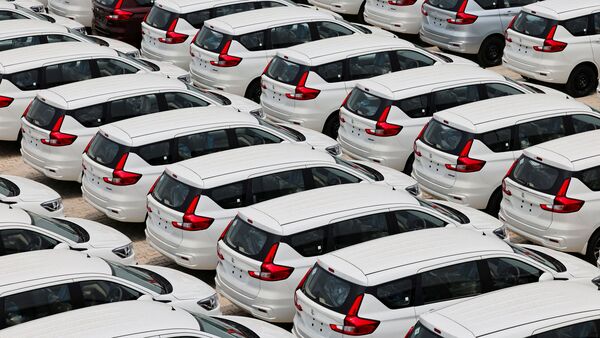Passenger vehicles in Indian market witnessed a softened demand owing to the ongoing speculations around potential changes in Goods and Services Tax (GST) on automobiles.

View Personalised Offers on
Passenger vehicle wholesales in India registered a sluggish pace for the fourth straight month in August 2025. According to industry estimates, passenger vehicle manufacturers in India dispatched as many as 3.30 lakh cars from the factories to dealerships last month, which recorded a seven per cent decline from 3.56 lakh units registered in the same month a year ago.


There are multiple reasons that played key roles in this sluggish growth pace for the industry. One of the key reasons is that consumers are delaying their purchase decisions as the government is working on a revised GST structure, under which the passenger vehicles are expected to see a reduced tax rate, especially the small and medium-sized vehicles that contribute the largest chunk in the segment. Besides that, the geopolitical crisis, economic uncertainties also played vital roles.
Car buyers hit wait-and-watch button
Since Prime Minister Narendra Modi announced a GST restructuring move during his speech on August 15, consumers have remained hopeful about the GST reduction on passenger vehicles. The proposed dual slab GST structure would bring down the total tax incidence on all the passenger vehicles in India, especially for the small cars, which have traditionally been the backbone of the industry.
According to the proposal, the new GST structure will have a five per cent slab and an 18 per cent slab. The passenger vehicles would be taxed at an 18 per cent rate, down from the current rate of 28 per cent. Also, the removal of compensation cess will bring down the total tax incidence for the car buyers, which is now at 29 per cent, at the lowest for ICE vehicles.
The expectation of saving a bit more money while buying a new car, thanks to the reduced GST and festive offers, has barred many potential car buyers from making the final purchase decision.
In a nutshell, GST ambiguity is impacting car buyers’ purchase decisions and enquiries, as they have hit the wait-and-watch button.
Soft domestic sales masked by surging exports
India’s leading car manufacturers reported mixed sales performances in August 2025. The major players in the Indian passener vehicle market have recorded both ups and downs last month. For many major players, the domestic market demand were softened, while export market masked the blow. Here’s a quick look at the key players’ August domestic and export sales performances.
Maruti Suzuki, the country’s largest carmaker, witnessed its domestic sales slumped by 8.2 per cent to 131,278 units last month as compared to same month a year ago, while exports rose by 40.51 per cent year-on-year (YoY) to 36,538 units. The compact segment, which includes models such as the Baleno, Swift, and WagonR, accounted for 59,597 units, while utility vehicles like the Brezza and Grand Vitara contributed 54,043 units to the total sales. Both mini, compact and utility vehicle segments of the company witnessed softened domestic sales compared to the same month a year ago.
Hyundai Motor India Limited (HMIL) reported a total sales of 60,501 units in the same month, comprising domestic sales of 44,001 units and exports of 16,500 units. Hyundai’s domestic sales in India were it by 11.16 per cent, while exports increased by 20.87 per cent on a YoY basis. Despite having highly popular SUVs like Creta, the South Korean auto giant couldn’t save it from the downfall in domestic sales.
Tata Motors recorded a seven per cent drop in domestic wholesales to 41,001 units last month, while exports rose sharply to 2,314 units, reporting a 573 per cent growth.
Mahindra & Mahindra too registered a nine per cent sales decline at 39,399 units in the domestic pasenger vehicle market in August 2025. However, exports figures for the homegrown auto giant surged by 16 per cent.
Check out Upcoming Cars in India 2025, Best SUVs in India.
First Published Date: 02 Sept 2025, 16:09 pm IST



